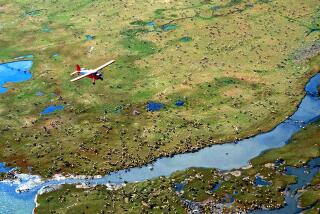Congressional Resistance Seen : Oil and Gas Exploration Sought in Alaskan Refuge
- Share via
WASHINGTON — In a recommendation headed for stiff resistance in Congress, Interior Secretary Donald P. Hodel on Monday urged that 1.5 million acres of the Arctic National Wildlife Refuge on Alaska’s North Slope be opened to oil and gas development.
Hodel cited prospects that huge oil discoveries could reduce U.S. dependence on foreign supplies significantly, and said that drilling on federal lands nearby, at Prudhoe Bay, had shown that wildlife--even sensitive species such as the caribou--can coexist with such activities.
“Our nation has proven that we need not choose between exploring for and developing the energy necessary for survival and growth on one hand and protecting the environment on the other. We can have both,” Hodel said at a news conference.
Environmentalist groups strongly protested Hodel’s recommendation, which must receive congressional approval before any lands in the wildlife refuge can be leased to private oil companies for exploration. The National Audubon Society said that the Reagan Administration should pursue energy conservation and development of alternative fuels instead of “sacrificing a crown jewel of our federally protected lands.”
Eskimos Want Industry
Two Eskimo leaders applauded Hodel. They said that oil and gas development would bring vital economic benefits to natives subsisting in the area without harming the environment. Jacob Adams, president of the Eskimo-owned Arctic Slope Regional Corp., and Oliver Leavitt, an elected assemblyman with the North Slope Borough, spoke for the Eskimos.
The plan will meet its biggest hurdle in the House Interior Committee, whose chairman, Rep. Morris K. Udall (D-Ariz.), has introduced legislation to designate the Arctic National Wildlife Refuge a protected wilderness and prohibit any drilling there.
Udall, sponsor of the 1980 Alaska National Interest Lands Conservation Act, which called for further study of the Arctic refuge, said in a statement that “the Interior Department recommendation is hardly surprising in view of the Reagan Administration’s relentless promotion of development at the expense of our environment. They are taking an enormous gamble with one of the irreplaceable ecosystems left on the continent.”
A Udall spokesman, Robert A. Neuman, however, suggested the possibility of compromise. He called Udall’s bill “a vehicle for discussion” and said: “You have to have two positions before you enter into an area of accommodation.”
Hodel said that geologists consider the coastal plain of the Arctic National Wildlife Refuge “the most outstanding onshore frontier area for prospective major oil discoveries in America.” The 19-million-acre preserve lies in the remote northeastern corner of Alaska, between Prudhoe Bay on the west and major Canadian oil fields east of the area.
An Interior Department study estimated that there is a 95% chance of recovering 600 million barrels of oil from the refuge and a 5% chance of recovering 9.2 billion barrels--an amount nearly equal to the Prudhoe Bay field, which currently accounts for almost 20% of domestic production. The mean estimate of the amount of recoverable oil was 3.2 billion barrels.
The report also speculated that there would be “major effects” on the so-called Porcupine herd of caribou and on musk oxen in the refuge, but “negligible” to “moderate” impact on brown bears, snow geese, wolves, moose and a second caribou population known as the Central Arctic herd.
The report said that oil production likely would reduce the size of the caribou calving area, but that it was “unlikely, though possible” that the herd would be diminished in size.
Caribou Figure Withdrawn
Biologists predicted that the musk oxen would be displaced from their habitat and that their growth rate would be slowed, but that oil production activities would not reduce their numbers.
Hodel said that a prediction of a 40% decline in the caribou population, made in a draft report, was an editing error. The Alaska Coalition, an alliance of environmentalist groups that includes the Sierra Club, charged that the number was “wished away.”
“These findings have been replaced with oil industry propaganda,” the group said in a statement.
More to Read
Sign up for Essential California
The most important California stories and recommendations in your inbox every morning.
You may occasionally receive promotional content from the Los Angeles Times.













